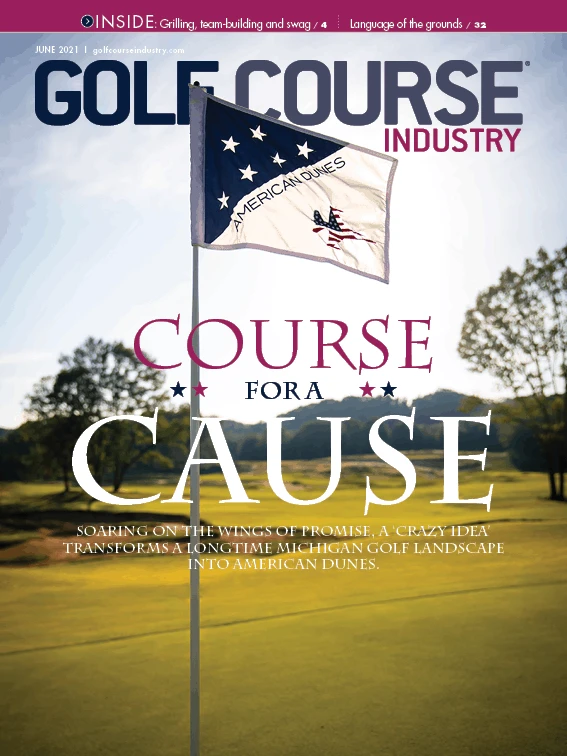
Devon Carroll is passionate about turf. And she’d like other women to share her passion.
Carroll calls herself a professional student. She has earned a bachelor’s degree in turfgrass science and a master’s degree in agronomy from Penn State, plus a second master’s in agricultural leadership from the University of Tennessee with a focus on opportunities for women in the turf industry. She’s currently working on her doctorate in turfgrass weed science from Tennessee.
As many superintendents are encountering difficulties finding enough staff to meet their needs, Carroll thinks it’s time to expand the labor pool. “I just think we’re not tapping into half the labor population,” she tells Rick Woelfel in the latest episode of the Wonderful Women of Golf podcast. “We need to do a better job of recruiting women because right now that’s an underutilized demographic.”
A native of northeastern Pennsylvania, Carroll grew up playing golf with her father and played golf in high school. She didn’t think about turf as a career until her cousin, a golf course superintendent, raised the possibility. “That was something that had not really crossed my mind before,” Carroll recalls, “but he went to Penn State for turf and I thought ‘You know what, he loves his job, and every day is unique and exciting for him, so I’d probably like it too.’”
Carroll enrolled at Penn State and encountered Dr. Andrew McNitt, who became one of her mentors. “Dr. McNitt teaches the intro to turf class” she says. “I remember taking a class with him and I wasn’t really sure if I wanted to keep turf as my major. He just made turf so fun and exciting.”
McNitt also helped arrange for Carroll to get some practical experience, as a member of the grounds crew for the State College Spikes, a professional baseball team that plays its home games on the Penn State campus. During summer breaks she worked for the Scranton/Wilkes-Barre RailRiders, the Triple-A affiliate of the New York Yankees.Carroll was also mentored by Dr. John Kaminski, another Penn State professor, who encouraged her to go to graduate school. “He really got me excited on that side of turfgrass,” Carroll says. “He helped win a grant to actually do my own research project. I was looking at creeping bentgrass germination to help superintendents who may experience winterkill. It’s been a really great experience since then to be able to do research. I feel like it’s helping superintendents; it’s helping the industry.”
If we hadn’t had those relationships prior to the pandemic hitting, I don’t think our industry would have done as well as it did.”
Arriving at Tennessee with the intention of working on her doctorate, Carroll experienced an awakening of sorts. “I took an agricultural leadership class as an elective,” she says, “and I really just loved it. The class was called Women in Leadership and the professor was Dr. Carrie Stephens. Her research area actually is women in leadership in agriculture. She was teaching us about how women in other agricultural industries are overcoming barriers and making it more normal for women to be in leadership roles.”
Carroll approached Stephens about doing research on women in the turf industry. Her proposal was approved, allowing her to work toward obtaining a second master’s degree while simultaneously working on her Ph.D.
“I interviewed 13 female leaders in the turfgrass industry from three different countries, including nine different U.S. states and three Canadian provinces,” she says. “We talked about what kind of barriers they faced but also what kinds of opportunities they see for women.”
Carroll believes it’s important to reach out to high school students and encourage them to consider a career in the industry.
“We need to be talking to students,” she says. “We need to be talking to them early. A lot of students choose in their sophomore or junior year what direction they want to head in college. If we’re talking to them in their senior year, we’re probably too late, so we need to start fostering that idea with students maybe in middle school or early high school.”

Get curated news on YOUR industry.
Enter your email to receive our newsletters.
Explore the June 2021 Issue
Check out more from this issue and find your next story to read.
Latest from Golf Course Industry
- Carolinas GCSA raises nearly $300,000 for research
- Advanced Turf Solutions’ Scott Lund expands role
- South Carolina’s Tidewater Golf Club completes renovation project
- SePRO to host webinar on plant growth regulators
- Turfco introduces riding applicator
- From the publisher’s pen: The golf guilt trip
- Bob Farren lands Carolinas GCSA highest honor
- Architect Brian Curley breaks ground on new First Tee venue






